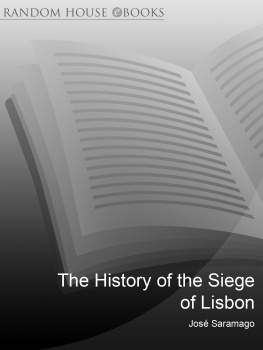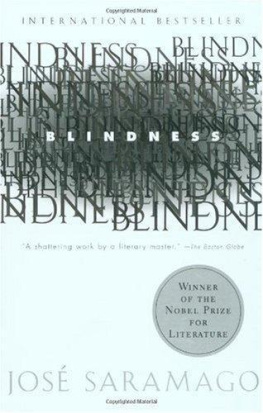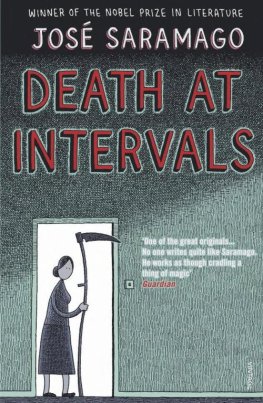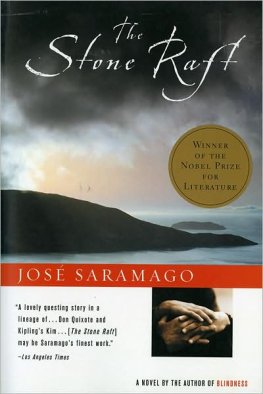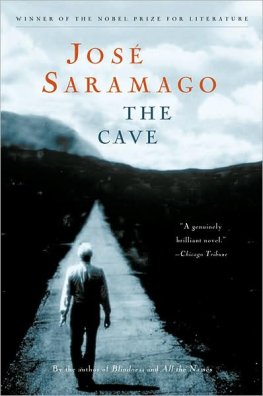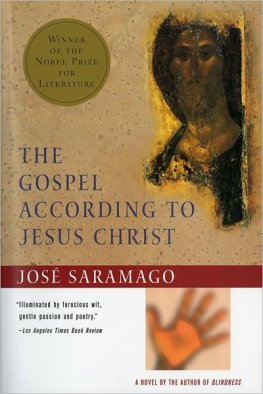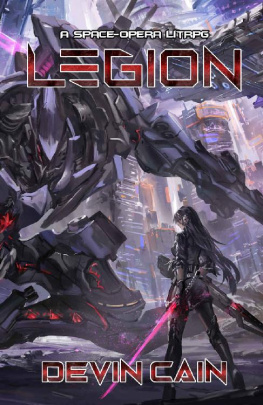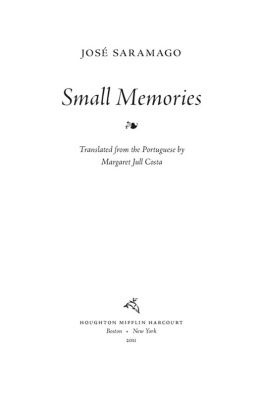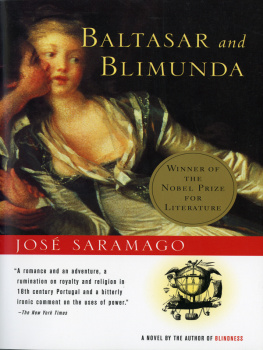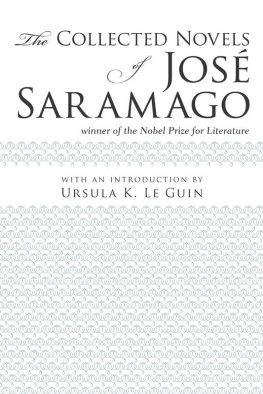
Copyright 2009 by Jose Saramago & Editorial Caminho, SA, Lisbon, by arrangement with Literarische Agentur Mertin, Inh. Nicole Witt e.K., Frankfurt am Main, Germany
English translation copyright 2011 by Margaret Jull Costa
First published with the title Caim in 2009 by Editorial Caminho, SA, Lisbon
First published in Great Britain in 2011 by Harvill Secker Random House
By faith Abel offered unto God a more excellent sacrifice
than Cain, by which he obtained witness that he was
righteous, God testifying of his gifts: and by it he being
dead yet speaketh.
Hebrews 11:4
Book of Nonsense
When the lord, also known as god, realised that adam and eve, although perfect in every outward aspect, could not utter a word or make even the most primitive of sounds, he must have felt annoyed with himself, for there was no one else in the garden of eden whom he could blame for this grave oversight, after all, the other animals, who were, like the two humans, the product of his divine command, already had a voice of their own, be it a bellow, a roar, a croak, a chirp, a whistle or a cackle. In an access of rage, surprising in someone who could have solved any problem simply by issuing another quick fiat, he rushed over to adam and eve and unceremoniously, no half-measures, stuck his tongue down the throats of first one and then the other. From the texts which, over the centuries, have provided a somewhat random record of those remote times, be it of events that might, at some future date, be awarded canonical status and others deemed to be the fruit of apocryphal and irredeemably heretical imaginations, it is not at all clear what kind of tongue was being referred to here, whether the moist, flexible muscle that moves around in the buccal cavity and occasionally outside it too, or the gift of speech, also known as language, that the lord had so regrettably forgotten to give them and about which we know nothing, since not a trace of it remains, not even a heart engraved on the bark of a tree, accompanied by some sentimental message, something along the lines of I love eve. It's likely that the lord's violent assault on his offspring's silent tongues had another motive, namely, given that, in principle, you can't have one without the other, that of putting them in contact with the deepest depths of their physical being, the so-called perturbations of the inner self, so that, in future, they could, with some authority, speak of those dark and labyrinthine disquiets out of whose window, the mouth, they were already peering. Well, anything is possible. With the praiseworthy scrupulousness of any skilled craftsman, making up with due humility for his earlier negligence, the lord wanted to make sure that his mistake had been corrected, and so he asked adam, What's your name, and the man replied, I'm adam, your first-born. Then the creator turned to the woman, And what is your name, I'm Eve, the first lady, she replied rather unnecessarily, since there was no other. The lord was satisfied and bade farewell with a fatherly See you later, then, and went about his business. And, for the first time, adam said to eve, Let's go to bed.
Seth, their third child, will only come into the world one hundred and thirty years later, not because his mother's womb required that amount of time to complete the fabrication of a new descendant, but because the gonads of father and mother, the testes and ovaries respectively, had taken more than a century to mature and to develop sufficient generative power. It must be pointed out to our more impatient readers, first, that the fiat was given once and once only, second, that men and women are not sausage machines, and, third, that hormones are very complicated things, they can't just be produced from one day to the next, nor can they be found in pharmacies or supermarkets, you have to let matters take their course. Before seth came into the world, cain had already arrived, followed, shortly afterwards, by abel. By the way, one must not underestimate the intense boredom of all those years spent without neighbours, without distractions, without some small child crawling about between kitchen and living room, with no other visitors but the lord, and even his visits were few and very brief, interspersed by long intervals of absence, ten, fifteen, twenty, fifty years, so we can easily imagine that the sole occupants of that earthly paradise must have felt like poor orphans abandoned in the forest of the universe, not that they would have been able to explain what the words orphan and abandoned meant. It's true that every now and then, although again not with any great frequency, adam would say to eve, Let's go to bed, but their conjugal routine, aggravated, in their case, due to inexperience, by the complete lack of alternative positions to adopt, proved to be as destructive as an invasion of woodworm to a roof beam. You hardly notice anything from the outside, just a little dust here and there falling from tiny holes, but, inside, it's quite a different matter, and the collapse of something that had seemed so sturdy will not be long in coming. In such situations, there are those who say that a child can have an enlivening effect, if not on the libido, which is the work of chemicals far more complex than merely learning how to change a nappy, then at least on feelings, which, you must admit, is no small gain. As for the lord and his sporadic visits, the first was to see if adam and eve had had any problems setting up house, the second to find out what benefits they had gleaned from their experience of country life and the third to warn them that he would not be back for a while, because he had to do the rounds of the other paradises that exist in the heavens. Indeed, he would not appear again until much later, on a date that has not been recorded, in order to expel the unhappy couple from the garden of eden for the heinous crime of having eaten of the fruit of the tree of the knowledge of good and evil. This episode, which gave rise to the first definition of a hitherto unknown concept, original sin, has never been satisfactorily explained. Firstly, even the most rudimentary of intelligences would have no difficulty in grasping that being properly informed about something is always preferable to being ignorant, especially in such delicate matters as good and evil, which could put anyone at risk, quite unwittingly, of being consigned to eternal damnation in a hell that had not yet been invented. Secondly, the lord showed a lamentable lack of foresight, because if he really didn't want them to eat that fruit, it would have been easy enough simply not to have planted the tree or to have put it somewhere else or surrounded it with barbed wire. Thirdly, it wasn't because they had disobeyed god's instructions that adam and eve discovered they were naked. They were already stark naked when they went to bed, and if the lord had never noticed such an evident lack of modesty, the fault must lie with a father's blindness, an apparently incurable infliction that prevents us from seeing that our children are, after all, neither better nor worse than all the others.
A point of order. Before we continue with this instructive and definitive history of cain, undertaken with unprecedented boldness, it might be advisable to introduce some clarity into the chronology of events. So, let us begin by clearing up certain malicious doubts about adam's ability to make a child when he was one hundred and thirty years old. At first sight, if we stick to the fertility indices of modern times, no, he clearly wouldn't, but during the world's infancy, those same one hundred and thirty years would have represented a vigorous adolescence that not even the most precocious of casanovas would have sneered at. It is, moreover, worth remembering that adam lived until he was nine hundred and thirty years old, thus narrowly missing being drowned in the great flood, for he died when lamech was still alive, lamech being the father of noah, the future builder of the ark. He would, therefore, have had the time and leisure to make all the children he did make and many more if he had so wished. As we said earlier, adam's second child, born after cain, was abel, a handsome, fair-haired boy, who, having been the object of the best proofs of the lord's esteem, met a very sticky end indeed. The third child, as we also said, was called seth, but he will not form part of this narrative, which we are writing step by step with all the meticulous- ness of a historian, and so we'll leave him here, just a name and nothing more. There are those who say that the idea of creating a religion was born in his head, but we have given abundant attention to such ticklish matters in the past, with reprehensible levity, according to some experts, and in terms that will doubtless prove deleterious to us when it comes to the final judgement at which everyone will be condemned, either for doing too much or too little. We are only interested now in the family of which father adam is the head, although he proved to be a very bad head, and we really can't put it any other way, since all it took was for his wife to offer him the forbidden fruit of the knowledge of good and evil and our illogical first patriarch, after a certain amount of persuasion, more for appearance's sake than out of any real conviction, duly choked on it, leaving us men marked for ever by that irritating piece of apple that will neither go up nor down. There are also those who say that the reason adam didn't manage to swallow the whole of that fateful fruit was because the lord suddenly turned up, demanding to know what was going on. Now before we forget about it completely or before our continuation of the story renders the fact redundant because it comes too late, we will tell you about the stealthy, almost clandestine visit the lord made to the garden of eden one hot summer night. As usual, adam and eve were sleeping, naked, beside each other, not touching, a deceptively edifying image of the most perfect innocence. They did not wake up, and the lord did not wake them either. He had gone there with the intention of correcting a slight flaw, which, as he had finally realised, seriously marred his creations, and that flaw, can you believe it, was the lack of a navel. The pale skin of his babies, untouched by the gentle sun of paradise, was too naked, too vulnerable, and in a way obscene, if that word existed then. Quickly, in case they should wake up, god reached out and very lightly pressed adam's belly with the tip of his forefinger, making a rapid circling movement, and there was a navel. The same procedure, carried out on eve, produced similar results, with the one important difference that her navel was much better as regards design, shape and the delicacy of its folds. This was the last time that the lord looked upon his work and saw that it was good.
Next page


